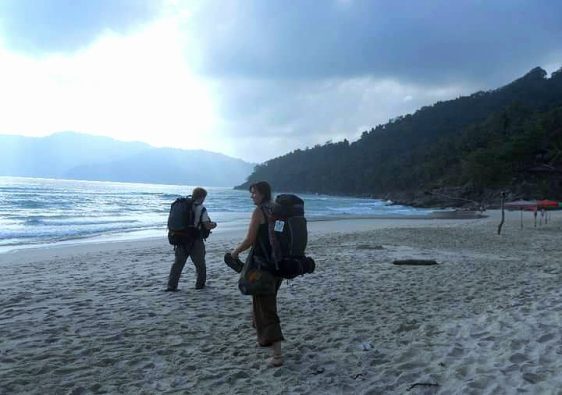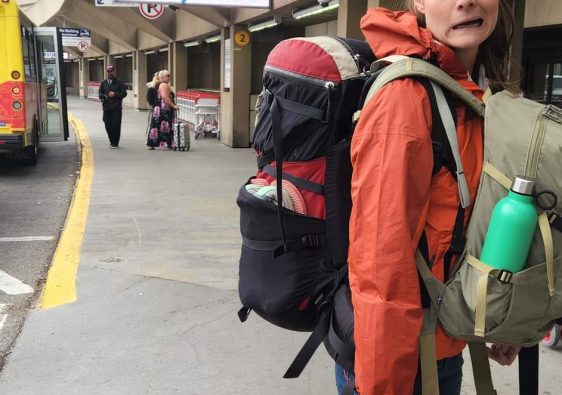Sustainability, eco-tourism, ethical traveling, respecting cultures, and having a low climate impact all fall under the umbrella of responsible travel. Traveling responsibly is such an important topic and there is so much depth that we could go into (stay tuned), but for now, let’s keep it simple.

Leave nothing but footprints, take nothing but photographs.
Starting out with a bit of a cliche, but there’s a reason it’s such a popular saying: it’s true! Returning home with nothing but photographs and amazing memories is the best feeling when paired with the knowledge that you did no damage during your time abroad.
Give out food to beggars vs money.

As long as there is poverty (and unfortunately, a market for it) there will be beggars. Sometimes these are families genuinely down on their luck, but sometimes the beggars you see on the streets are actually “enslaved” to gather money for a “boss”. If this is the case, no money that you give to the poor woman holding an infant will actually go to her.
A better option is to hand out food. Something that they can eat right away and can’t be resold or returned.
Buy locally made souvenirs.
This beats purchasing a cheap, imported trinket anyday. This way, there is more meaning behind your souvenir and you’re helping a local in their home country.
Stay in locally owned and/or eco friendly hotels.

Not only are these better for the planet, they are often more unique and come with stories you could never gather from a Holiday Inn.
Do not feed wildlife.
I completely understand how difficult it is to not interact with wildlife everywhere I go. However, it’s so important to refrain from doing so (no matter how cute they are!). When you toss snacks to critters, it can cause a load of issues including:
- The animals eating something dangerous to them.
- The animals getting comfortable with humans, but remaining wild animals, can lead to attacks.
- The animals becoming so reliant on snacks from tourists that they can’t survive as long in the wild.
On that same note, select activities involving wildlife wisely.

It’s tempting to get into that tigers cage for a great instagram photo or hop onto that elephant’s back for a good video, but make sure the company you are supporting is actually supporting the animals. Many companies know tourists will pay blindly, so the animals are mistreated as they are seen as, simply, a means to the money.
However, some organizations out there are in the business of conservation and care of wildlife. Be sure to do your research when you find a wildlife-involving tourist activity. When you arrive at the site, look around at how the workers are interacting with the animals & only support those that support their animals.
Reduce your carbon footprint:
- Travel longer/slower. If you are already on the other side of the world from home, not only is it cheaper to make your trip last longer, but taking only one flight to one area of the world is better for the planet.
- Donate to carbon offset organizations: Isangi REDD+ project, planting trees in the Congo or South Pole for climate projects and carbon offset are good places to start.
- Take overland transport (train or bus) across countries instead of flights. Reducing your flights reduces your carbon off put. Plus taking a local bus or cross country train is a much more exciting experience!
Bring your own eco-friendly bug spray & reef safe sunscreen!
There are a few good brands to choose from. I like the sunscreen from Young Living and bug spray containing citronella essential oil is always a good bet.
Pack with the planet in mind.

A few items I carry with me on every trip, international or not, are: water bottle, Life straw (or some other kind of water filter), metal straw, cloth tote/produce bags, togo containers, and reusable coffee cup. This list could go on with shampoo & conditioner bars, bamboo floss, cutlery set, etc.
Stay aware.
If you notice there is a recycling bin at your hostel, but don’t see any out on the city streets, pop your empty can into your backpack & recycle it when you get back. If you see trash on the beach, pick it up & put it in a nearby trash can. Select a drink in a glass bottle vs the plastic option.
Get off the tourist track.

When you take the streets less wandered by other travelers and vacationers, you will be exposed to an incredible view of the culture you are in. There are more opportunities in these areas to meet and connect with locals, spread the wealth when you buy from their small shop or market stand, and see what everyday life is like for someone not surviving off of tourists. Not only is this great for the local, but it’s an amazing way to broaden your experiences.
Plan activities caringly.
Look into the tourist activity options in the area you will be visiting. Seeing the wilderness via a hike is better for the environment than taking a cruise, for example. How eco-friendly is the company you are choosing to support? & is there a better alternative? Is the business run by a local family or a big corporation? Are a few questions I ask myself when planning activities abroad.

Do your research.
Look into the local customs of the region you are visiting. Be respectful of their belief systems and cultural norms. Stay conscious of the sites you are visiting and dress respectfully (even if this means being covered from neck to ankles in a hot country).

REMEMBER: You are a guest visiting their home and integrating into their everyday lives. Be respectful and mindful of the impact you have and the impression you are making.



